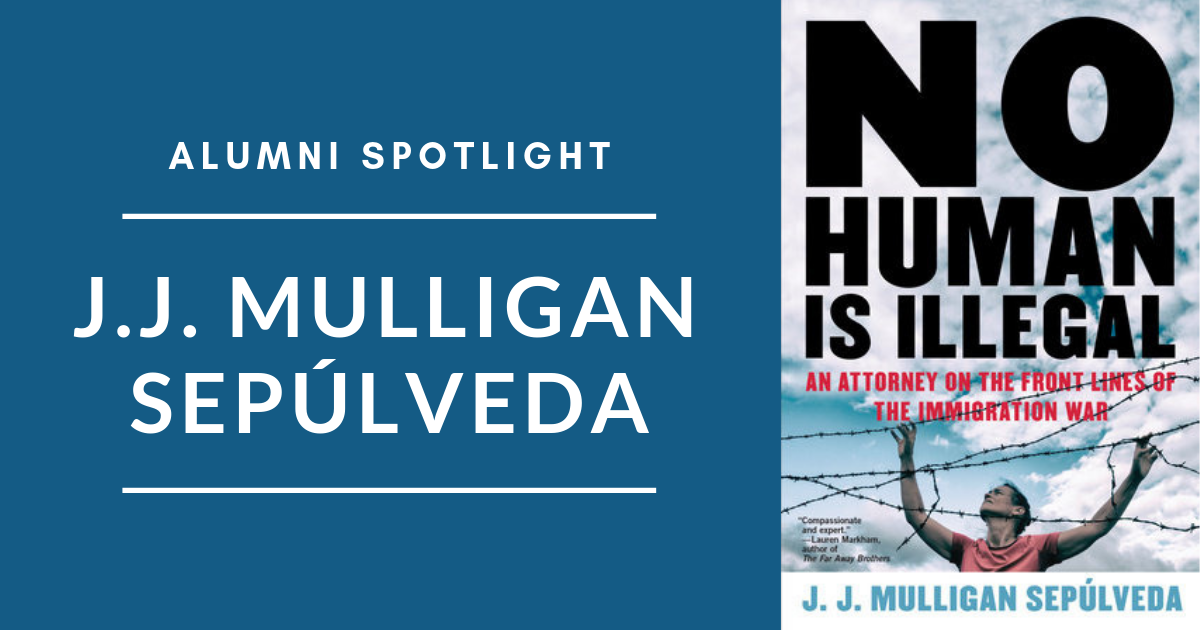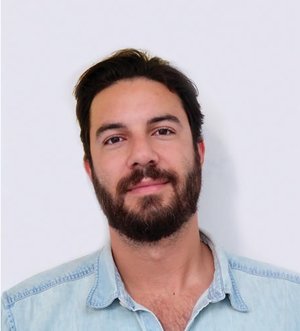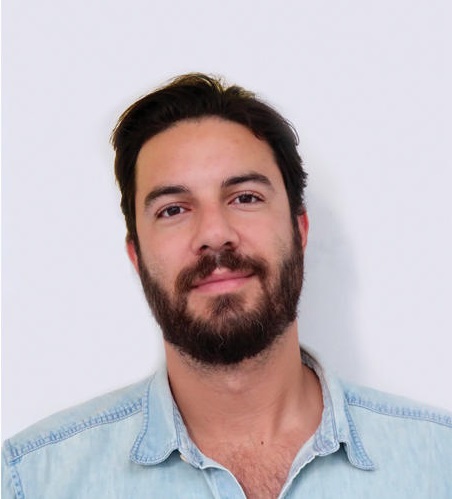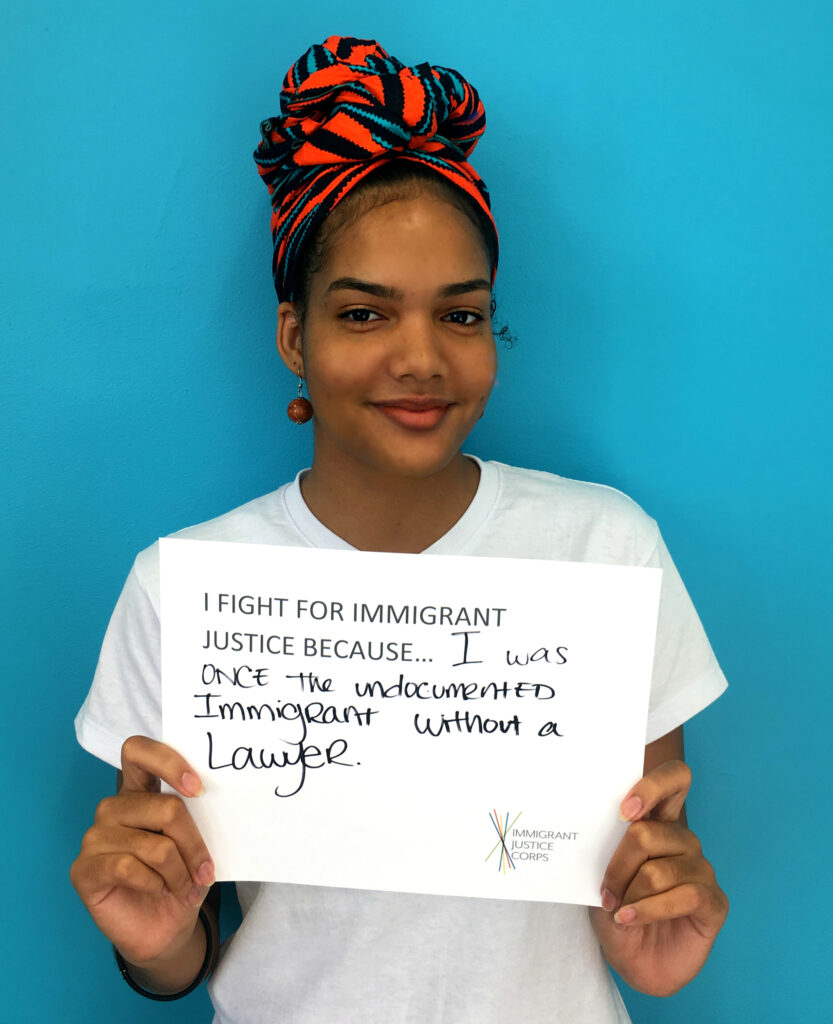Alumni Spotlight: J.J. Mulligan Sepúlveda
IJC alumni J.J. Mulligan Sepúlveda’s first book, No Human Is Illegal, is a powerful and timely account of his work fighting for those seeking a better life in America and escaping one much worse. We spoke with J.J. to learn how his IJC Fellowship helped shape his career.


J.J. is someone who has always kept notebooks and journals. So when the emotional weight of his work as an immigration lawyer became overwhelming, it was only natural for him to turn to writing. His wife, a psychologist, helped J.J. recognize the vicarious trauma he had developed as a result of the work he was doing. She encouraged him to write about it. This cathartic practice eventually became No Human Is Illegal, J.J’s first book, published by Melville House on January 23, 2018.
Of his motivations, he observed, “I didn’t write with the idea of publishing a book”. “I wrote it to gain an understanding of what this country is doing to immigrants.”
As a law student, his focus honed in on immigration during his first semester at the University of California Davis School of Law’s Immigration Law Clinic. “It really got me addicted to the one-on-one client interactions,” he said, “and how you change their lives and they change yours.”

His passion for immigration law is also personal. Growing up with a father who was an attorney got him thinking about the law and how it affects people’s lives at an early age. His mother’s story too played a huge role. She left Chile after the country’s military coup in 1973, amidst the brutal disappearances of friends and family.
Joining IJC as a Justice Fellow in 2015 felt like a natural next step after law school for J.J. “I thought it would be a fascinating way to get training. It’s a very unique program, I felt like I was part of something larger. IJC was helping expand legal representation and had a public defender mentality for immigrants in removal proceedings. That was really attractive to me.”
His placement was with Atlas: DIY in Brooklyn, New York, an organization that assists immigrant youth. “I had never worked with youth before. The strategy is different and fascinating. It was during the height of the unaccompanied minor surge so there were a ton of recent arrivals. We were seeing a lot of people from Central America as well as from Haiti, Africa, the Caribbean. Coming from California, where most of the immigrants I worked with were Mexican, New York opened my eyes to different immigrant populations.”
“One of the most fascinating things about working with youth is that they are at the beginning of their lives. There are people I’m still in touch with now and today they’re seniors in college or nursing students. You build a connection. They’re like family.”


The 2016 election landed right in the middle of J.J.’s fellowship with Immigrant Justice Corps. Like so many, it galvanized his passion for immigration work.
“I never took Trump seriously until he got elected,” J.J. said. “Every one of my clients would ask me, ‘What’s going to happen if he’s elected?’ I told them he would never be president. But they knew. It didn’t seem possible to me but they were seeing this country in a way I couldn’t have, and they saw it coming.”
In June 2016, he was part of an emergency response team of lawyers that went to JFK Airport after Trump’s travel ban. “It ended up being a big IJC thing because so many Fellows came,” he said, “It was kind of like an IJC reunion.”
He says the experience was both sad and uplifting. “We didn’t know if this would be the new normal,” he said. “But every time we looked out the glass doors of the terminal we saw thousands of protesters showing their support – it gave us hope.”
J.J. said he also drew a lot of strength from his fellow IJC classmates. “After the election, people were saying ‘Immigration lawyers are amazing and their doing such great work,’ but the reality is that we were struggling. It’s always been a difficult job, but since Trump’s election it was like, ‘Are you ready for what this job means now?’”
Along with his writing, the relationships he built with classmates proved to be a huge network of support. “It was really important to have that release with people who understood.”
At such a difficult time for immigration, IJC was there to support J.J.’s passion for helping others. “IJC is really unique in what it provides. It was an incredible experience to meet with advocates from around the country. It was great to have other people, who have certain expertise, to bounce ideas off of – it felt like you had a lot of support. You long for that camaraderie and support once the Fellowship is over.”
“The amount of clients we take on during the Fellowship along with the training we received is really how you learn in immigration law. The need is so great and the access to justice gap is so large – having that support and training is the best way to dive in.”
With so many challenges facing immigration attorneys today, J.J. said he stays grounded by celebrating the small victories. “You focus on the good moments, on helping a young person – listening to their story. Even if you don’t get the green card, you listen, and little by little you hope that you can help change someone’s life.”
J.J. is among the 92 percent of IJC Justice Fellows who continue to practice in the immigration field. He has returned to his alma mater to work full-time at UC Davis School of Law’s Immigration Law Clinic. He supports rural public defenders and their immigrant clients and provides counsel to detained unaccompanied children. He’s traveling to Florida soon to provide counsel and report on the confinement conditions of unaccompanied children housed at the Homestead facility.
His advice to the 2019 incoming class of IJC Fellows? “Make friends with your fellow Fellows and learn as much as you can. This is one of the best learning experiences I’ve had, and one of the best learning experiences you can get as an immigration lawyer.”
NO HUMAN IS ILLEGAL is a powerful document of one lawyer’s fight for those seeking a better life in America against its ever-tightening borders. For author Mulligan Sepúlveda, the son and husband of Spanish-speaking immigrants, the battle for immigration reform is personal. Mulligan Sepúlveda writes of visiting border detention centers, defending undocumented immigrants in court, and taking his services to JFK to represent people being turned away at the gates during Trump’s infamous travel ban.
